GEM Japan AMED held the GEM Japan Workshop titled Global Career Advancement of Genome and Health Data Scientists
Reported by Chihiro Hata, AMED Science and Technology Researcher
23 August, 2019
The GEM Japan Workshop titled Global Career Advancement of Genome and Health Data Scientists was held in AMED, where Japanese data scientists who have been engaged in AMED programs convened to introduce their activities and discuss the future of genomic science with Ewan Birney (GA4GH Chair).
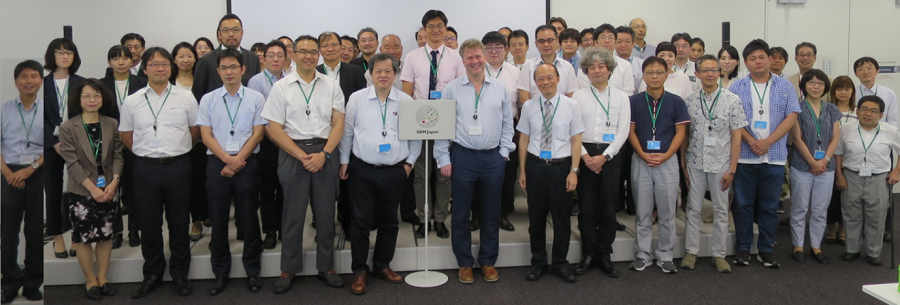 Participants in the GEM Japan Workshop
Participants in the GEM Japan Workshop
The workshop began with an opening remarks by Makoto Suematsu (AMED President) who presented the demographic transition of Japanese population and the anticipated contribution of Japanese data scientists to the upcoming super aging society. Then a keynote speech was provided by Ewan Birney, who illustrated the progress and challenges in genomic and clinical data collection, use, and sharing, and then introduced the activities of the GA4GH to deal with the challenges. Ewan Birney described ‘We need to build bridges from the world of research to the world of medicine – in both domestic and international manners. I would like everybody in the world to benefit from human genome and discoveries.’
-
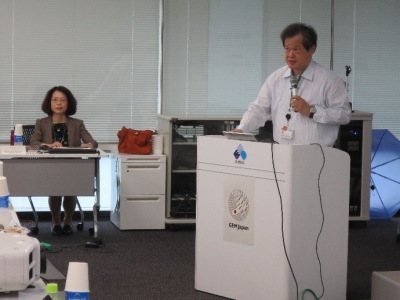 Opening Remarks by Makoto Suematsu
Opening Remarks by Makoto Suematsu
-
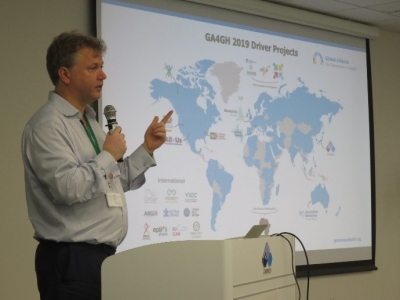 Keynote Speech by Ewan Birney
Keynote Speech by Ewan Birney
In the GEM Japan activities session, Soichi Ogishima (Tohoku University) explained the IRUD (Initiative on Rare and Undiagnosed Diseases) project, localization of Human Phenotype Ontology, and the AMED Biobank Cross-search system which will facilitate progress in research. Katsushi Tokunaga (National Center for Global Health and Medicine) overviewed the human leukocyte antigen (HLA) system that encodes the major histocompatibility complex (MHC) proteins essential to the immune system, followed by the NGS-based HLA typing and the accurate inference of HLA genotypes from whole-genome sequencing (WGS) data.
-
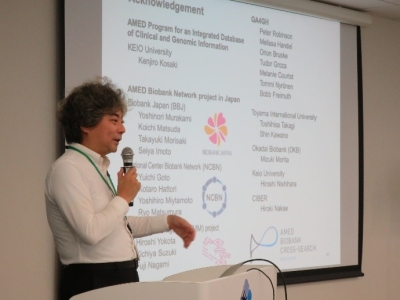 Soichi Ogishima, Tohoku University
Soichi Ogishima, Tohoku University
-
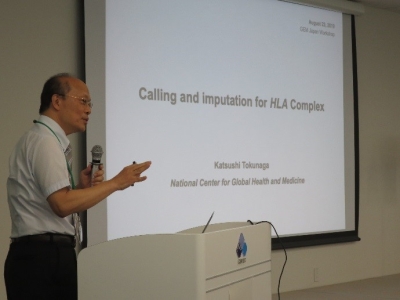 Katsushi Tokunaga, National Center for Global Health and Medicine
Katsushi Tokunaga, National Center for Global Health and Medicine
In the afternoon, Japanese data scientists presented their activities with the aim of sharing their expertise and had fruitful discussions with Ewan Birney.
Akihiro Fujimoto (University of Tokyo) talked about the detection of intermediate-sized structural variants from long sequencing reads, Mamoru Kato (National Cancer Center Research Institute) explained the cancer panel testing recently covered by insurance, Yoichiro Kamatani (University of Tokyo) introduced the RADDAR-J which is an information platform for sharing and secondary use of rare diseases data, Shin-ya Nishio (Shinshu University) presented a new database for information of congenital hearing loss patients, Nao Nishida (National Center for Global Health and Medicine) explained an integrated database of viruses and liver cancer, Tsuyoshi Hachiya (Iwate Medical University) talked about a development of Polygenic Risk Score model using GWAS SNPs, Akihiro Nakaya (Osaka University) introduced dementia data storage which is a platform for sharing genome and clinical information of dementia patients, and reported analysis results using LDscan, Branko Aleksic (Nagoya University) presented an identification of disease-related genes in patients with autism spectrum disorder or schizophrenia, Licht Toyo-oka (NBDC) talked about TogoVar, a variant information portal which integrates Japanese and overseas variant resources, and 10,000 Japanese WGS variant-calling project.
In the panel discussion, the five panelists discussed the topic about technical development required for the sharing of health-related data. The talk covered the current situations of the data sharing, DTC (Direct-to-Consumer), long-term follow of participants, and the use of EHR (Electronic Health Record). In conclusion, the panelists mentioned that in order to achieve goals it is necessary to build bridges between physicians and researchers as well as bridges between wet and dry researchers through mutually respectful conversations.
-
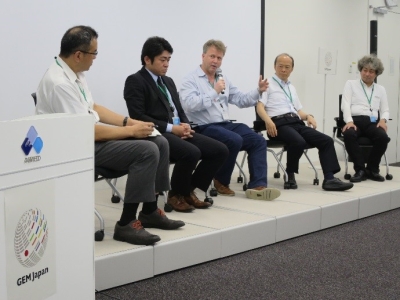 Panel Discussion
Panel Discussion
-
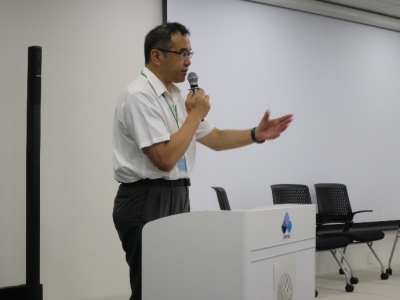 Hidewaki Nakagawa, RIKEN
Hidewaki Nakagawa, RIKEN
Finally, Hidewaki Nakagawa (RIKEN) made a closing remarks emphasizing the merits and needs of establishing closer relationship with the GA4GH.
In this workshop, participants had the opportunity to share the activities of Japanese data scientists in research and clinical settings, and realized the challenges in genomic and health related data sharing using global standards.
Last updated 09/04/19

